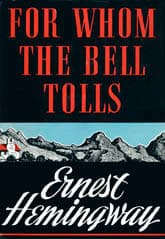For Whom the Bell Tolls
Critique • Quotes • At the movies
 First edition
First editionFirst publication
1940, United States
Literature form
Novel
Genres
Literary, war
Writing language
English
Author's country
United States
Length
Approx. 270,000 words
The big reddish one
For me this is the big Hemingway book—his greatest work and one of the most significant novels of the twentieth century. And it is a big book, his longest.
But For Whom the Bell Tolls does not read as long. Partly because the majority of it is dialogue and much of the rest is interior dialogue within the protagonist.
But mainly because it contains the most vivid scenes, the strongest characters and most intense action you are likely to find in a serious novel. All written in Hemingway's leanest prose, without a single unnecessary frill.
And, for only the second time in a major Hemingway novel, it is written in the third person, albeit strictly from the protagonist's point of view.
Robert Jordan is a demolitions expert assigned during the Spanish Civil War to work with a Republican unit in the mountains. The Spaniards, living in caves and fighting as what we would call guerillas today, are ostensibly led by Pablo, a once noble fighter for democracy who has degenerated into little more than a bandit. The real rebel power rests with Pilar, a strong old Spanish woman, one of the most memorable fictional creations in Hemingway's work. The other members of the group also become well known to us as they fight the enemy and interact among themselves.
Jordan falls in love with Maria, a traumatized young victim of Franco's Falangist forces. But in the end Jordan must serve a higher end than sexual love.
Puffed-up principles
Long after the dramatic ending of the novel, what may stay with you, apart from two or three indelible characters, are the gripping and chilling stories told by those characters about events from the class war taking place in Spain in the mid-1930s.
Especially and rightfully famous are the parallel stories of the fascists arriving in Maria's village, executing her parents against a slaughterhouse wall, and the uprising in Pilar's village in which the fascists are executed by running them through a gauntlet and over a cliff.
Hemingway's usual cynical attitude toward puffed-up principles in general and toward war in particular is still evident in For Whom the Bell Tolls. Jordan goes out of his way to eschew strong political commitments, pointing out he aligns himself with the communist factions of the Republican forces only because they are the best organized and most disciplined. In the end he's willing to sacrifice himself for personal attachments—for his comrades and his love.
But beneath this, his deepest connection, as shown by the matched opening and closing passages, is to nature, to the earth under his body, from which he comes and to which he will surely go.
But in this novel Hemingway's cynicism is also modified by his acceptance that the Spanish Civil War is unlike previous wars and that some causes—such as that of the Spanish people against oppression (and by extension, the fight already underway in Europe against fascism)—are worth fighting and dying for. This gives the novel a drive not always found in his more detached works.
— Eric
Critique • Quotes • At the movies

